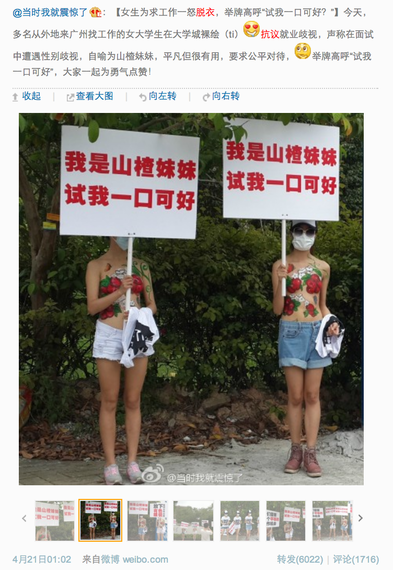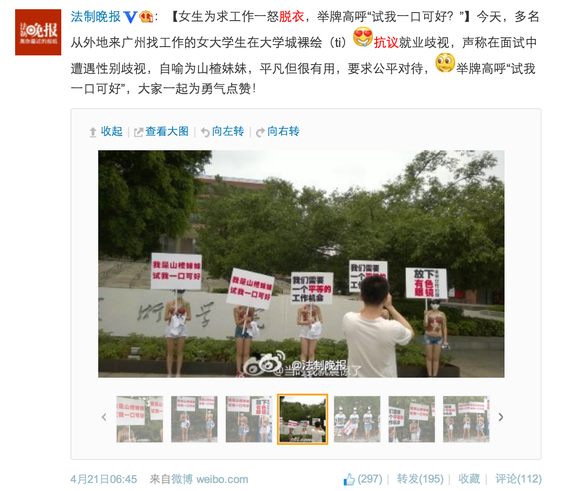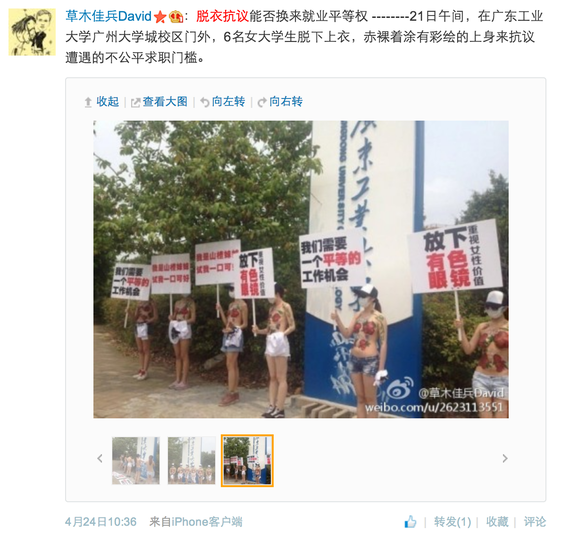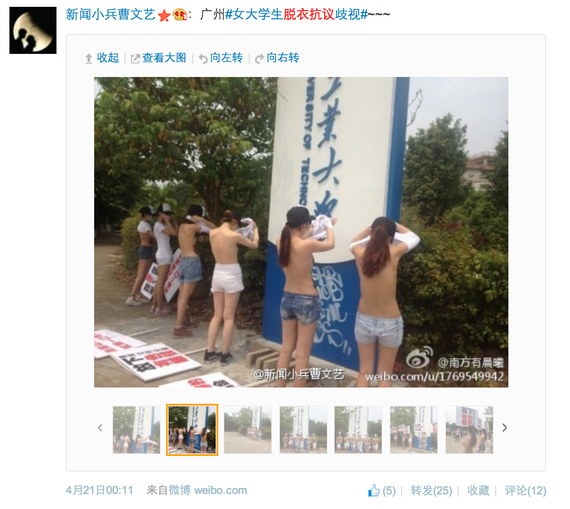On April 21st, six young women arrived at the entrance to the Guangdong University of Technology bearing signs that read, "value the worth of the female sex" and "we need equal employment opportunities". A third sign read: "put down your colored glasses", a Chinese double-entendre because the character for color can also refer to sex. Previously an unknown group, they billed themselves as the "Hawthorne Sisters Student Alliance", though English sources have bafflingly failed to provide the group's name. They handed out fliers apparently explaining that they had come to Guangzhou looking for work, but had faced sex discrimination in interviews. They then removed their shirts to protest topless but for strategically painted Hawthorne berries and flowers.
Similar protests are hardly unheard of on US campuses. In the People's Republic of China (PRC), however, norms about such things are significantly more conservative, just consider that these photos of female graduates showing some leg were considered "controversial" (definitely safe for work). A handful of pictures of the incident rapidly circulated around the Chinese and then English internet. Predictably, netizens began to debate whether such protests were effective, merely sensationalist, or even counter-productive. Others drew comparisons with similar protests in other countries, such as those organized by the European feminist group FEMEN. For a researcher deeply imbedded in the literature on social movements in China, however, this commentary seemed to be largely missing one of the most interesting facets of the incident:
Successful protesters in the PRC need to find ways of attracting attention without numbers, because large well-organized action invites repression.
Twenty-five years after the Tiananmen square protest the central fact remains that it is large-scale well-organized collective action, above all, that makes the Chinese state feel threatened and elicits repression. Falun Gong protesters learned this the hard way 15 years ago when their peaceful protest outside the central party compound of Zhongnanhai turned them into enemies of the Chinese state and set off a decade and a half of ruthless repression. Similarly, a recent groundbreaking study shows that China's massive internet censorship effort clamps down quickly on anything that could lead to collective action or protest, even if it is not explicitly anti-government. Yet, vitriolic anti-party comments are generally allowed to stay up, as long as they do not threaten to spill out onto the streets.
Whether these woman recognized it or not, they have stumbled upon an extremely effective tactic given the constraints of the contemporary PRC. What made these women's protest so effective is that they were able to garner wide-spread attention without looking threatening to the Communist Party. Less sensationalist tactics probably would not have attracted much attention and significantly larger numbers almost certainly would have resulted in some type of official response/repression.
Other tactics have likewise managed to achieve viral status without large-scale organization and resulted in at least some satisfaction for individual grievances. Some such strategies have employed a fictional daughter offering her virginity, a homemade rocket launcher, a couple of kung fu masters, and stubbornly-undemolished houses standing in the middle of huge pits or major expressways. For the most part, however, these tactics are unrepeatable, which would seem to differentiate them from those of the Hawthorne Sisters.
FEMEN has proven that even in more culturally liberal Europe toplessness retains the ability to shock and attract attention (NSFW) and People for the Ethical Treatment of Animals (PETA) have repeatedly made use of nudity in their campaigns. Artist Ai Weiwei has also recognized the protest potential of both male and female nudity in China, though his stature makes it a somewhat different proposition for him. Whether or not the Hawthorne Sisters stick with it, protests of this kind are likely to remain effective in grabbing attention in China for some time to come. One incident does not make a trend and a "topless Tiananmen" seems an unlikely prospect. Nevertheless, the Hawthorne Sisters have identified a protest sweet spot that takes advantage of the Chinese Communist Party's monomaniacal focus on large-scale collective action.




